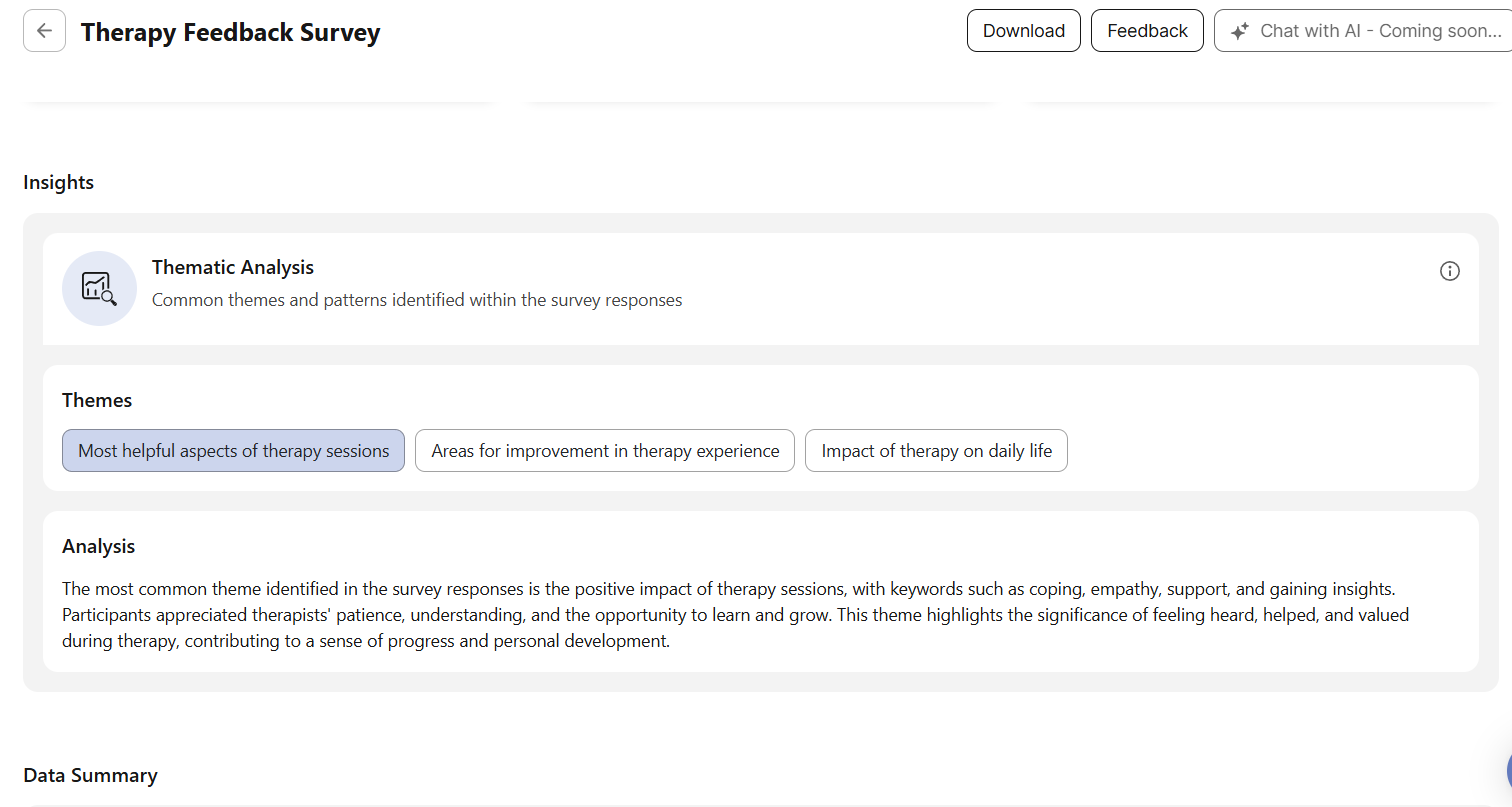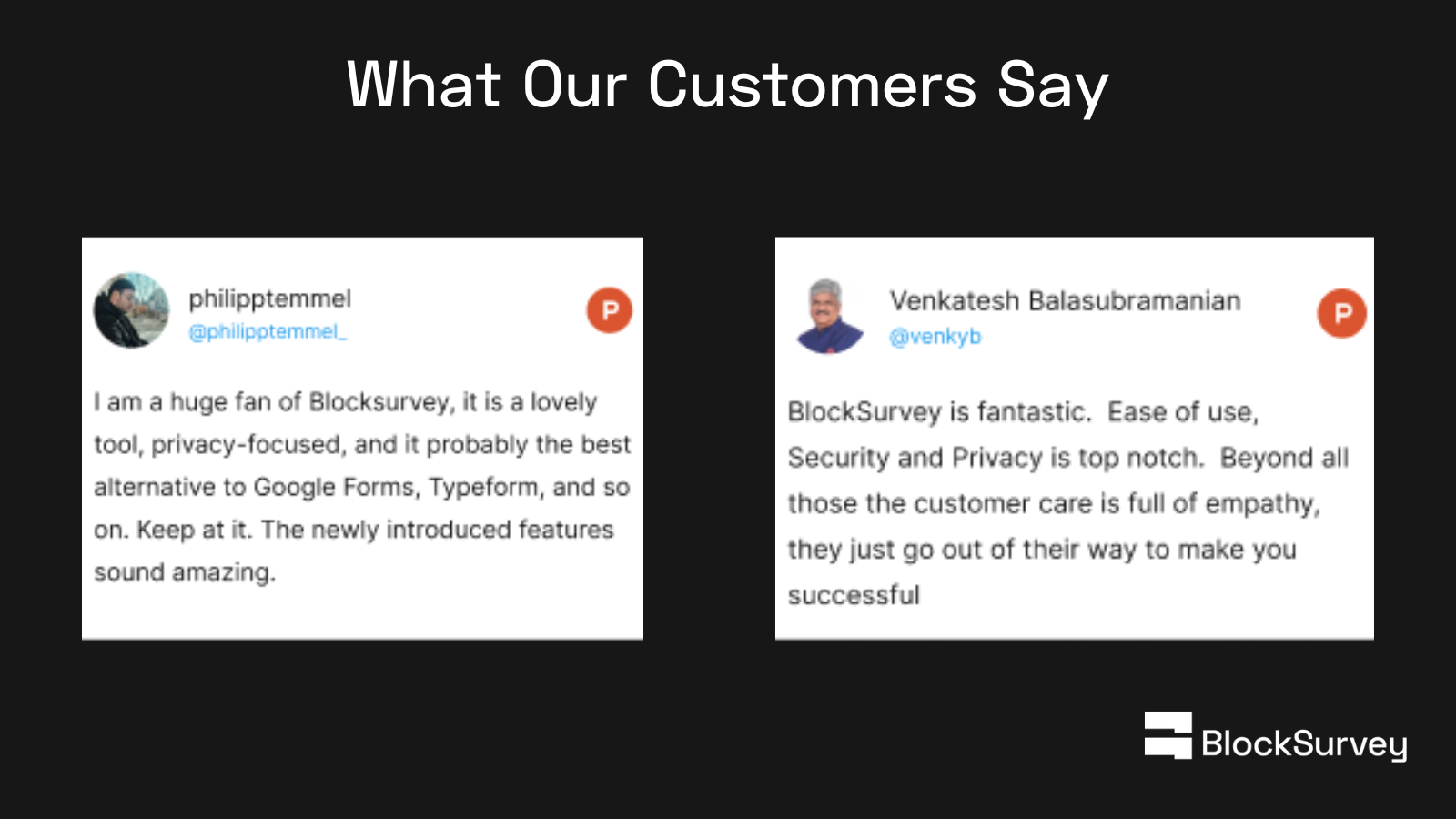- Thematic Analysis Software: Smarter AI Support for Researchers
- Top AI Tools for Qualitative Data Analysis in Mental Health Research
- BlockSurvey - AI-Powered Insights for Mental Health Research
- NVivo with AI Assist
- ATLAS.ti + AI Coding
- Dovetail
- Quirkos
- ChatGPT (for Flexible Thematic Exploration)
- Closing Thoughts
Get insights.
Unlock value.
- 14-day free trial
- Set up in minutes
- No credit card required
Best AI Tools for Thematic Analysis in Mental Health Research
If you’ve ever spent weeks buried in transcripts, coding line by line, and felt like the data is swallowing up your whole time, you’re definitely not alone.
For many mental health researchers and psychologists, making sense of pages of interviews, therapy notes, or survey responses can feel never-ending. Thematic analysis is powerful, but it’s slow, repetitive, and mentally draining when done manually.
Even with all that effort, it’s easy to miss subtle patterns or recurring themes that could reveal some important insights.
- Thematic Analysis Software: Smarter AI Support for Researchers
- Top AI Tools for Qualitative Data Analysis in Mental Health Research
- BlockSurvey - AI-Powered Insights for Mental Health Research
- NVivo with AI Assist
- ATLAS.ti + AI Coding
- Dovetail
- Quirkos
- ChatGPT (for Flexible Thematic Exploration)
- Closing Thoughts
Thematic Analysis Software: Smarter AI Support for Researchers
A recent 2024 JMIR study shows that AI-powered text analysis can really help researchers by cutting down bias and making qualitative work faster and more efficient. The problem? Many of us are still stuck doing everything manually or using old software that slows us down.
That means hours of work get wasted, and sometimes the most meaningful insights never make it to the surface.
The good news is, there’s a better way. With qualitative data analysis AI tools designed for thematic analysis, you can strike the right balance, letting automation handle the heavy lifting while you stay in control of the insights.
In this guide, I’ll walk you through some of the best AI tools for thematic analysis in mental health research, so you can choose the one that fits your workflow best.
Top AI Tools for Qualitative Data Analysis in Mental Health Research
Tool Name | Features & Strengths | Best For | G2 Rating |
BlockSurvey | AI-driven thematic analysis with end-to-end encryption; supports data collection + analysis in one platform. | Researchers needing a HIPAA/GDPR compliant, unified workflow | 4.8 / 5 |
NVivo (AI Assist) | Auto-coding, visualizations, integration with transcripts; powerful but complex. | Large-scale academic projects | 4.1 / 5 |
ATLAS.ti | Supports text, image, video; AI classification and chatbot query; excellent support. | Multimedia-rich qualitative research | 4.7 / 5 |
Dovetail | Auto-tagging, intuitive UI, collaboration-friendly, and centralizes qualitative feedback. | Lightweight team projects | 4.4 / 5 |
Quirkos | Drag-and-drop interface, live visual coding, affordable and beginner-friendly. | Students or small-scale projects | 4.5 / 5 |
ChatGPT | Summarizes transcripts, drafts coding frameworks, great for exploratory analysis. | Early-stage brainstorming & ideation | 4.7 / 5 |
BlockSurvey - AI-Powered Insights for Mental Health Research
If you’re looking for a tool designed with therapists, psychologists, and researchers in mind, BlockSurvey stands out. Unlike traditional survey platforms, BlockSurvey integrates AI-driven thematic analysis directly into data collection. You don't need to stitch different platforms to do data collection and analysis.
Thematic Analysis
No more endless manual coding. AI automatically pulls out recurring themes from interviews, surveys, or therapy notes. You stay in control of the insights while AI does the heavy lifting, giving you more time to focus on interpretation.

Sentiment Analysis
Quickly see the emotional tone behind responses, whether respondents are hopeful, stressed, or struggling. Spot patterns in mood or concerns at scale, so you don’t miss important signals in the data.
Anonymous Responses
Collect sensitive mental health data with full anonymity, backed by end-to-end encryption and zero-knowledge security. Respondents feel safer sharing openly when they know their identity is fully protected. Check out how the anonymous seal works.
HIPAA Compliant
Designed with privacy and healthcare rules in mind, so you don’t have to worry about data safety or legal compliance.
AI Adaptive Questioning
Surveys change in real-time based on answers, making the experience more natural and personal for every client. No more one-size-fits-all assessments, our AI adapts the flow so only the most relevant questions are asked.
Saves Time & Budget
Cut down analysis time by up to 12 hours a week with instant AI summaries and automated coding. Get powerful research features without breaking the budget, making it one of the most affordable AI tools for therapists.
Limitations: Only text analysis is supported right now.
Want to see AI thematic analysis in action? Sign up now! Check out our pricing to scale up your analysis.

NVivo with AI Assist
NVivo has been a go-to in qualitative research for years, and now with AI-assisted coding, it speeds up theme detection and coding from transcripts. It’s feature-rich, but can feel overwhelming for solo researchers.
Pros:
- Powerful visualizations to spot theme frequency and connections.
- Strong integrations with transcription tools.
Cons:
- Expensive for independent researchers.
- Steep learning curve if you’re new to qualitative analysis.
ATLAS.ti + AI Coding
ATLAS.ti combines traditional coding strength with AI that helps classify text, suggest themes, and even handle multimedia data. Great for projects that mix interviews, videos, and images.
Pros:
- Handles text, video, and image data seamlessly.
- AI suggests emergent themes to reduce manual coding.
Cons:
- Pricing is on the higher side.
- Interface can feel clunky compared to modern tools.
Dovetail
Originally built for UX, Dovetail’s clean interface and AI tagging features make it appealing for health researchers, too. It’s especially useful if you work in teams.
Pros:
- Easy-to-use with auto-tagging and clustering.
- Great collaboration features for research groups.
Cons:
- Not designed specifically for psychology or therapy research.
- Limited advanced coding options compared to NVivo or ATLAS.ti.
Quirkos
Quirkos is lightweight, affordable, and built for those who want simple AI support without diving into complex software. Perfect for students or smaller projects.
Pros:
- Simple drag-and-drop coding interface.
- Budget-friendly option for individuals or classes.
Cons:
- Not as feature-rich as larger platforms.
- Limited scalability for bigger datasets.
ChatGPT (for Flexible Thematic Exploration)
ChatGPT isn’t a dedicated research tool, but it shines in brainstorming, summarizing, and finding early patterns in transcripts. Think of it as a fast, supportive research assistant.
Pros:
- Quick summaries and draft coding frameworks.
- Great for reducing overwhelm in early analysis stages.
Cons:
- Not reliable for final or formal coding.
- Requires careful researcher oversight to avoid bias.
Closing Thoughts
Thematic analysis in mental health research doesn’t have to feel heavy. With BlockSurvey, you get a tool that handles both data collection and AI-powered analysis in one secure space. No more jumping between platforms or worrying about compliance - it’s all built in.
Sure, NVivo, ATLAS.ti, Dovetail, or Quirkos might suit depending on your workflow and budget, and ChatGPT can help with early exploration. But if you want something designed for therapists and researchers, BlockSurvey is the perfect fit. Try Now! Have more questions? Book a demo now!
Best AI Tools for Thematic Analysis in Mental Health Research FAQ
What is thematic analysis in mental health research?
Thematic analysis is a method for identifying and interpreting patterns or themes in qualitative data such as therapy notes, interviews, or open-ended survey responses. It helps researchers make sense of narratives and uncover deeper insights into patient experiences.
How can AI improve thematic analysis?
AI tools can automate repetitive tasks like coding transcripts, grouping similar responses, and detecting recurring themes or sentiments. This speeds up the process, reduces human bias, and frees researchers to focus on interpreting insights rather than manual coding.
Is BlockSurvey really HIPAA compliant?
Yes. BlockSurvey is built with HIPAA and GDPR compliance, end-to-end encryption, and zero-knowledge architecture—so your participants’ sensitive data stays private and secure.
How does BlockSurvey compare to tools like NVivo or ATLAS.ti?
While NVivo and ATLAS.ti are powerful for academic-scale projects, BlockSurvey is unique because it combines data collection and AI-driven thematic analysis in one platform. This makes it easier and faster for therapists and researchers who don’t want to juggle multiple tools.
Can AI replace human researchers in thematic analysis?
No. AI speeds up coding and pattern detection, but human oversight is still essential. AI helps reduce fatigue and bias, but researchers bring context, empathy, and interpretation—especially important in mental health research.
Get insights.
Unlock value.
- 14-day free trial
- Set up in minutes
- No credit card required




